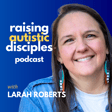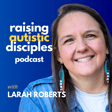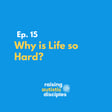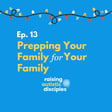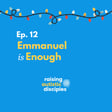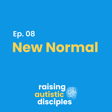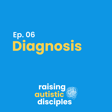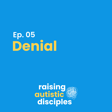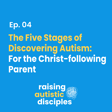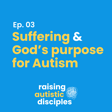Become a Creator today!Start creating today - Share your story with the world!
Start for free
00:00:00
00:00:01

Education & Advocacy
Join Collin & Larah as they discuss the final stage of the autism diagnosis for the Christ-following parent: Education & Advocacy.
You can find their book, "How to Advocate & Stay Christian," on Amazon: https://amzn.to/3SpITcb
Transcript
Introduction to Hosts
00:00:02
Speaker
Welcome back to season one of the Raising Autistic Disciples podcast. My name is Lara and I am here with the one, the only, Colin Roberts. My husband and our kiddos dad. Thank you for being here today. Oh, absolutely. It's not like you're, I mean, you're part of this podcast too. I don't know why I just said that, but again, I'm thankful that
Colin's Social Media Presence
00:00:26
Speaker
you're here. Well, I enjoy being usually be on that side of the camera, but in our marriage, when you have an idea,
00:00:33
Speaker
I usually support it. You are, you're a dream maker. I just don't like being on the side of the camera too often. But I will say people are asking for you. Why? Because you're full of wisdom and you have some, which we'll get to in a second when we talk about our book, but you are being sought after in the Instagram community to talk more, so. Okay. Well, I only take my cue from you, so. There you go. All right, well.
00:01:01
Speaker
Here we go.
Stages After Autism Diagnosis
00:01:02
Speaker
Hey, what we've been doing over the past few podcasts is helping parents and we're on this journey too. So it's not just us telling you, the listener, like what these five stages are, but what we've experienced in the last six or so years of Graham after Graham's autism diagnosis is that they're five stages that parents walk through when it comes to understanding the autism diagnosis, when it comes to the emotions that are a part of that. And so what you've been, if you've caught up to this one by now, you've gone through the stages of something's not right, not wrong, something's not right. And we kind of consider that one a stage, but it's kind of more the process that gets you stepped into the stage. It's So a check engine light, so to speak. It's a check engine light, exactly.
Education and Advocacy Link
00:01:48
Speaker
And then denial, diagnosis, grief and acceptance, new normal, which you talked with Pastor Wayne last time about, and then today's episode, we're going to be covering education and advocacy. So they both go together, education and advocacy. Why do you think those... Why are we not doing two separate episodes with education and advocacy? Why do they go together?
00:02:10
Speaker
but i I think once I say this, it'll probably be obvious to most people, but you can't advocate for something you don't know. oh yeah And so if you if you're unaware of the the target, what the what the actual content knowledge is of what you're trying to advocate for, if you're not educated, then you can come off harmful, right? And you can say something out of ignorance. And I don't mean that ignorance But negatively just your ignorant of certain things so you can end up in conversations that you're gonna speak confidently on. But then have no real content knowledge is gonna make is gonna make your entire argument and your advocacy same.
00:02:49
Speaker
same kind of pejorative or unnecessary because you're not educated. right So educating yourself first is important before you can advocate. So they're extremely linked or inextricably linked. So might as well do this episode together because everything that we're talking about is going to tie.
Understanding Autism Education
00:03:08
Speaker
right yeah And when we say education, what are we really trying to convey in that one word? Are we are we talking like deep research? Are we just talking about knowledge? I mean, that's kind of the same thing, but what are we talking about when we say education?
00:03:21
Speaker
yeah and ah think we're
00:03:25
Speaker
Well, I think we're going to get to in a second about what it's not because I think that's probably more of a ah better understanding later, but, uh, and we'll kind of bounce this off each other. But the, I think for an education standpoint, it's, it's being content aware about what other people are going through about, especially when it's, you know, the brain of an autistic person typically. Now we're going to talk about in a second, what that means specifically for your child.
00:03:50
Speaker
ah But educating yourself on what what it is, what its diagnoses are, especially when it comes to words that are culturally acceptable, right vocabulary. So I don't want to make the sound more like a... But yes, it's it's a lot of knowledge. And so it's just like a walk with the Lord. We we can't but can't talk about what we don't
Knowledge, Faith, and Character
00:04:09
Speaker
know about. right and so i and a There's a book called Infinite Journey that talks about sanctification, and it's it it has a cycle that's called the knowledge, faith, character, and action cycle. so if you're and The K stands for knowledge, that when your knowledge when your mind is filled with what you love, it's going to influence your faith.
00:04:30
Speaker
And then as your faith grows and influences, it's going to develop character. As your character develops and it continues to grow, then it's going to lead to an action. So you you only if it works itself back around, you only do an action, what do you know? So your knowledge kind of influences all of that.
Explaining Autism to Others
00:04:47
Speaker
So if your desire is to let know and love your child well and to glorify the Lord in the diagnosis that He's given you to steward for His glory, then you have to know about it. Right. Be educated. Right. Absolutely. And from what I've experienced and then talking to other parents, like we have to know so that we can explain to people. Yes. Right? Because and a lot of patients comes along with that, right? Also going to be very honest and transparent here.
00:05:13
Speaker
there are people who s think differently than what we are going to describe in this podcast. So we need to clarify. I need a preface before we start. This is Lara and Colin Roberts. This is how we have asked the Lord to help us as we put on gospel lens.
00:05:30
Speaker
to view the autism diagnosis from an education point, an advocacy point.
Beliefs About Autism’s Origin
00:05:35
Speaker
um So yeah, so this is just us. This is not any doctors or anything, just what we've gathered through time studying the word and also understanding autism. um But again, we're not doctors. There are other people that think differently than what we believe and we'll get to that, but what we believe is true. So let's go Let's go down memory lane for a second. Okay. Okay. I love memory lane. Memory lane. Well, memory lane for me is going back to when I was 16. Oh goodness. I didn't even know you when you were 16. I know. Yeah. Not a lot has changed, especially with this illustration I'm about to talk about. Man, this is new. I wouldn't prepare for this. I'm excited. So let's talk about 16 year old Lara learning to drive. Ooh.
00:06:16
Speaker
Yeah. You, you would have, you would have, um, I do remember your story about the Buick. Is that where we're going? Yeah. So my mom's Buick. There you go. So I passed down my mom's Buick. So did not have a right turn, uh, blinker. So I had going driving into my high school. I had to roll down the window, stick my arm out and do like the, the hand upward sign to make sure drivers, you know, behind me knew that I was turning. Yeah. It was a very humbling experience. Right. Was it, or was it a window crank or was it a button?
00:06:44
Speaker
Uh, you know, I think it was a window crank. Oh man. That's back in the day. Yeah. Our children don't even know what those things are. So you had to, you had to crank. Yeah. I had to really give some effort. I did. I did. Um, and so, okay. So when, if you're, you know,
Learning Analogies for Autism
00:06:59
Speaker
I don't know what the age of driving is. I'm assuming it's still 16 at this point in 2024. So if you're 16 or above, you know that there's a process to obtain a permit or a driver's license to operate a moving vehicle on the road. Praise the lamb. Right. We have some some friends that are in that in that phase of life.
00:07:20
Speaker
man. I'm not looking forward to it. I'm going to be honest. Yeah. Yeah. Um, because I remember my patient and incredibly sweet mom doing the, you know, air break on the passenger seat. Yeah, it was. Yeah. That's sanctification. It is. Okay. So, but there is a process to get, getting a driver's license. And you have to go through these steps. You have to learn, obviously. You have to retain memory to take a test to get a license. I would hope that they would not let you on the road with other innocent passengers and drivers. So with that whole process, I think as we go into education and advocacy, why education is so important is because you've used this analogy with me. This is why I'm going there. And with other people that are trying to understand
00:08:06
Speaker
You're, you're giving keys to a vehicle that you don't know how to drive. Yeah. Or even, even as we were talking earlier, it was, it's even slightly deeper than that is most of the time. If you, if you're not educated, you're trying to drive a car, you don't have the keys to yeah drive your car.
Challenges Without Autism Knowledge
00:08:22
Speaker
You don't have the keys to. Yeah. Yeah. So like, um, so it's a, cause oftentimes I think we feel like we have the keys and we don't, that's the reason why we wrote the book. So when we talk about that in a minute,
00:08:33
Speaker
where oftentimes whenever you're dealing with an autism diagnosis with your child, it feels like it's it's a grind, but it's almost like pushing a car appeal. yeah But when we have access to the keys, but we have access to the engine, but we don't access that. We live in our flesh. we All we're trying to do is just survive.
00:08:52
Speaker
right And we're not, we're not tapped into what is going to truly give us the strength and perseverance to move on and to keep going. Right. Absolutely. And so what I tell a lot of people is, listen, we're all on step one after the diagnosis. Nobody tells us at the hospital when they hand us a baby to go home or even if your adoption stage, like unless you're the developmental, nobody hands it. Oh, they have autism. no It's because of developmental, you learn signs over the the course of age. And so we're all at step one when we get this diagnosis of of what to do, you know, where do we find resources? And so um just kind of jumping into education, we have to know what autism is. And this is the part where
00:09:32
Speaker
I say there are, I don't know how many sides, but there are sides of beliefs, right? What we are saying is you have to know what you believe. Just like we've encouraged in previous episodes, know what you believe about God so that you do have that gospel lens on to understand autism and suffering and trials and all that.
00:09:52
Speaker
to, you need a belief about what autism is. That's right. And so do your own research. We're going to kind of tell you what we believe, but we don't want you to say, okay, just because Colin and Lara believe it, I should believe it too. No, like do your research. There's going to be some of you that disagree and that's totally fine. um But what we've come to is, is a after reading, after research, after talking with professionals, um all of the above, we've come to understand um that autism is a
Autism’s Inherent Nature
00:10:19
Speaker
wiring of the brain. Absolutely.
00:10:21
Speaker
And that is what we believe. We believe it's from birth. um ah you know i I have gone in circles around other people um that it's because of toxins and vaccines and things like that. Listen, if that's where you land, that's where you land. okay I believe it's from birth in a wiring of the brain. Yeah. And that God didn't make a mistake.
00:10:41
Speaker
Correct. Yeah, yeah. So at the at the end of it, the even though if it's even though there's... Because we're in a fallen world, we have we have things between all of us as people that that cause suffering and a heartache and things that we have to work through, right? But God didn't forget how to make children when He made our children, right? And so that's ah i think that's I think that's important on the main. yeah No matter what you believe, you're a your kids not forgotten. right You're not forgotten. right Yeah. Right. Absolutely. And so just for practical sake, when we talk about what is autism, um here's how I have, ah you know, when you're at the family reunion or you're at the Thanksgiving thanksgiving dinner table or something like that, and you're aunt Lucy or you're, you know, crazy uncle.
00:11:28
Speaker
you know, Pete wants to know, okay, well, what exactly is autism? You know, here's how I've learned to explain it to people that kind of makes sense. One, I used to explain it like, because this is all I could remember when we went to Disney World, is the whole ah Fantasia firework display where everything's just going nuts. yes Right? That's a sensory overload for anybody. oh yeah But like, that's what You know, I feel Graham's brain is trying to make sense of a lot of times. That fireworks show where everything's happening you don't know to focus on. But here's a little bit more simpler way. um Imagine the brain is a super busy highway system, okay, when we're born. As we grow up, our brains do some cleaning up, like streaming the highways to make them more effective, right?
00:12:10
Speaker
For people with autism, their brains have some differences. In their brains, some highways stay super busy all the time, okay? While others are not as busy as usual. It's it's like having some roads with constant traffic and then others less traveled. ah So this unique pattern and can affect how their brains process information that's coming in. yeah Right? So these differences in how the brain is wired in individuals with autism can also lead to variations in how they process information and interact with the world around them. The persistent hyper-connectivity and under-connectivity observed in different brain regions might contribute to the distinctive cognitive and sensory traits associated with autism. Oh, yeah, yeah.
00:12:54
Speaker
So, for example, autistic individuals may have strengths in areas like attention to detail, pattern recognition, logical thinking. On the flip side, they may have challenges in social communication, flexibility in thought, and dealing with sensory um stimuli, right?
00:13:11
Speaker
These specific outcomes vary among individuals' autism as the spectrum is wide and um has diverse ways of manifesting
Autism's Unique Brain Highway
00:13:21
Speaker
itself. Understanding these brain differences helps researchers and e educators tailor the support and interventions to better meet the unique needs of individuals' autism.
00:13:31
Speaker
um i want to I want to add like that understanding these brain differences helps us as disciple makers, right? Believers in Jesus, disciple makers, support interventions and better meet.
00:13:47
Speaker
the needs of auto segmentals, how they think. So it's it's like explaining that whole illustration as the the busy highways seem to help people understand how that brain is wired. What would you add to that? Yeah. So before I before do that, so let me ask you a question just as you're reading that and as you formulated that yeah that succinct understanding.
00:14:09
Speaker
if you were to get, put a, just a general wild number on it, how much, how much time, prayer and effort went into just writing that simple paragraph? Oh man. I mean, i definitely did I definitely wanted to give an illustration to those you know close to us trying to understand, because we do have friends that are that move toward us, and we're like, I just, I need to get it, I need to understand, because I want to love him. that's right And that that alone to us as parents has been an extreme amount of blessing. But but you know we have some we have different types of friend we have different types of family members that think differently. And so you know some are very... ah
00:14:44
Speaker
ah ah was the a analytical thinkers, some are creative types and things like that. So it's best, how can we form an analogy that helps understand we what we know to be true as his parents, how the brain is wired. And so just prayerfully like, hey, listen, this is a something we do every single day. We we drive, right? yeah And so you know by sitting in traffic or you know by um when when it's busy
Empathy in Autism Education
00:15:11
Speaker
and when you know, how information is transferred in your brain and how you think.
00:15:17
Speaker
like correlate that somehow into this illustration, right? And so, yeah, just because I do think people, no matter what type of thinker you are, it is helpful. I mean, Jesus did in parables, right? yeah And so I was trying to figure out some way that was down to earth, simple to understand so that people would empathize and like some people aren't going to. yeah And that's the word. It's the, it's the empathy because you've observed it. Yeah.
00:15:43
Speaker
You've seen it in all the other families in the myriad of interactions, right? We see it.
Personalizing Autism Education
00:15:49
Speaker
And so between, when you're taking the knowledge, the knowledge is and my mind cut up into two areas. It's the analytical, there's the medical, it's the stuff that we can read and talk about. But then when you see that played out in real life and the kids and families that are around, that is, uh,
00:16:06
Speaker
So all of that kind of cements into an understanding where you you can you're trying to say something that's empathetic to everyone, right? Because the desire is for them to, and obviously, what we've written is what a to know and to know the Lord and love Him forever, right? So the goal and the effort of that education is that. It has the empathy.
00:16:25
Speaker
Yeah, so kind of moving forward and listen, we don't have a lot of time to go over what I'm about to say in this podcast, but we will do a podcast in the future. Another reason why solidifying your understanding of what autism is, um is because there are going to be theories, there are going to be advice, and unfortunately, there's gonna be shame, too, that come at you and that it's going to cause... It does at first, and like ah because this is why it's important to know what autism is, and prayerfully know, and asking the Lord to help you understand, because you're gonna be combative, I will say that, I will use that word, because that's that's my experience, with theories and advice and um
00:17:11
Speaker
you know healing is a big um ah circle, right? And like I said, we'll discuss that in future episodes, but like that's why it's it's so important that you know and you understand, but can we caveat just one second? Yeah.
00:17:24
Speaker
Because I think in next episode, we're going to do a season recap. And there are some things in the next episode, because it's been almost a year since we launched this podcast and and did the first few episodes. There's going to be some things that I regret regret saying in episode one and two. We'll we'll do that next episode. That's a good teaser. I like that. I'm interested in that too. And so with that said,
00:17:44
Speaker
I am not saying that there's not room for change in the future. Yeah, yeah. I'm also not saying that I'm going to completely go against what I believe convictionally today. Mm-hmm. But what I am saying is we're all learning. Yeah, yeah. And so, like i'm not I'll be completely open-handed.
00:18:04
Speaker
in two years if we do more research and things surface. I think that's learning in general, right? Yeah, absolutely. So i don't I don't want listeners to think and think that I'm hard set and cemented on some of these issues right because I'm always willing to change. But from what I read in Scripture, because it it is the only source that's 100% true, trustworthy, yeah um and our our our source of truth, right? And so from what I read in Scripture and what I know that he is fearfully and wonderfully made and that he's an image bearer of God, that's by the lens by which I've landed that it's a wiring of the brain and it was from birth. Absolutely. And that's, a because I think what even what you're saying there in a year's worth of information that we've gained and desired to educate ourselves since then,
00:18:50
Speaker
It's also helpful when you're theorizing or in any or hypothesizing however, however you want to call the endeavor of educating. that's also helpful to know what it's not. Yeah. Yeah. Right. So like in that year, like you said, there's things that have come along, but I think I know, especially for us, we've, we've learned more about what education isn't like when you're trying to educate other people, yeah because your goal of educating is to then communicate to other people what it is that you know, so that you can be helpful to others. So like, ah and what would you say our education is not, um,
00:19:28
Speaker
What is education not? Um, I would say that education is not trying to, which this is, this gets a little bit controversial. Um, because I believe as this autism circle of parents, like we bond together because we know each other's common struggle, but sometimes, and listen, I've caught myself in this, so I need to apologize if, if, and this is what we don't want our podcast to be, but we also want our podcast to be very, uh, like we're on the same journey, but we just gotta be careful that your child is not my child.
Avoiding Assumptions About Autism
00:19:58
Speaker
hundred percent Well, you like what you said about the wiring of the brain. Everybody's brain is different. Correct. So therefore, if it's wired different and the brains are also different, that kid's not your kid. Right. So we have to be careful on how we approach conversations with other parents of, um well, did you try this? Well, you need to do this.
00:20:17
Speaker
yeah Like just be careful how you come about that and just rather it it is a lot of terminology. I'll be honest yeah of how it lands on certain parents. Like I, I kind of shrink back when somebody tells me, Oh my goodness, you haven't tried XYZ. You know, you should do this. That's why your kid is doing this. You don't know. Yeah, because at the, and I know this is when you're, when we're saying controversial things, I would like to preface. I'm not, we're not experts. Yeah.
00:20:46
Speaker
But I do know that I shouted out the best I could ever be in this life as an expert on Graham. you Right, because I mean, that the experience that we have with him, the desire that we know it that he knows and love that loves loves the Lord, and the best I could ever be is an expert on him. right and So I can be empathetic and helpful when it is necessary. And other parents can be empathetic and helpful for us. But at the end of the day, you have your child. right Your child is specifically,
00:21:16
Speaker
specifically diagnosed with autism and it's going to manifest in his or her brain a very specific way and it will be wildly different than someone else. Right. So at the best, at the best case scenario, education is knowing your child. Right. Exactly. Yeah. Yeah. Yeah. So true. And then as you know, your child, because I know this question may arise, like, would you please cover like schooling and therapies and things like this? Listen, yeah again, we're about to talk in advocacy, so we don't want to kind of,
Setting Realistic Goals for Graham
00:21:43
Speaker
uh, uh, we don't want to,
00:21:45
Speaker
pull the cart before the yeah pull the cart for the whatever like When it comes to schooling, I think I've said this on Instagram before, I'm never gonna give advice about schooling because of this very the the very line that we just said, your child is your child, I don't know your child. that's right And so I'm gonna do what's best with the Lord, Holy Spirit is leading us, you and I to do for Graham. And that's what we've done thus far and we're gonna continue to do. And when we go into IEP meetings and they ask us that one question, what do you what do you consider success for Graham? We say to get to the next grade level successfully. That's right, yes. Like we're not putting one foot in front of the other 10 years from now. We don't know what's going to happen in 10 years. So what I'm saying is education in the, in the terms of if people are thinking, okay, would you please answer like what we should do for schooling, what we should do for therapies? I can't answer that the same thing. Research, educate yourself and pay attention to your child and pay attention to your child. Here's one thing I will say, and we can kind of dialogue about this. There does come a point.
00:22:44
Speaker
where you can make decisions that put your family financially in not a good position. yeah And so I would consider and prayerfully ask the Lord, ask wise counsel, when does it come to that point where you've done your education on autism, you are understanding what your child's needs are, but then it's like, okay, I've understand my child. He really needs therapy, but our insurance doesn't cover it. So now we need to go into debt to get him that therapy. yeah Listen, we're parents, so our hearts are like, I want to help our kids. And don't get me wrong, I'm not trying to say, don't help your kid. But that's something that we've seen happen. It doesn't even wait in the balance, for sure. And if we're just to singly say something else that it is not, education is not necessarily a
Therapies for Autism Adaptation
00:23:32
Speaker
path to healing. Oh, yeah, that's a- Okay, so now what I, that is, like I said, that's a hot take for another thing. But what I mean by that is,
00:23:41
Speaker
Is it just because you're more educated, you're not going to find the fountain of youth somewhere that's going to magically dip your kid in and he's going to be, he or she is going to be healed. You know what I mean? So the best possible scenario that you're getting and gaining from an ABA type therapy, which is still positive. It's not negative all the time, but it's specific to your kid. The best you're going to help them do is become more like,
00:24:06
Speaker
become adaptable to our neurotypical world. yeah all that All the ABA and most things they're trying to do, which are helpful, is there's a whole world out there that's neurotypical. There's a ah typical way of understanding how the brain works. Our whole society's been oriented around it. Now we're now we're putting neurodivergent kids into it.
00:24:25
Speaker
And it's not designed for them. It's designed for other people. So you're trying to hit them the skills that can at least help them navigate through a world that is not designed for them to be in. And so that's, that's hard because you want your kid to be able to drive, you want to go to work, you want to be able to do all the things that you have desired for them.
00:24:44
Speaker
And some of that and may be necessary, but you just got to pay attention to your child, right right? You're an expert on that that one child. And we're not knocking therapies. No, no. We're not knocking any there. Like, again, it's it some may work. Some have the stories that are read horrible experiences with certain type of therapies. Others have horrible, ah good great experiences. was Some people have horrible experiences with this type of schooling yeah environment. Some have great, you know, so like it is your child. That's your child. and so but Again, we'll get into that in another episode of the whole, you know, what can we do to turn it around? Yes, absolutely. Yeah, very hot take. no Yeah. um So wrapping up this portion, anything else education wise, just know your child, ah research, understand autism, be able to articulate is it. Yes. Just like the gospel. like Yes. That's what I'm like. we've got to and we We have to be able to speak and understand what the gospel is. We also have to understand and be articulate when we're educating people on what autism is. Because you don't want to distract people from what you're trying to say yeah um because you're not educated. Right.
Shifting to Active Advocacy
00:25:47
Speaker
Because you can't say, just don't make it the lack don't make ignorance a barrier to other people understanding what your child needs. Yeah, yeah totally.
00:25:56
Speaker
All right, advocacy. Oh, come on. Man. ah So I'll be honest, I don't know if before the four grams autism diagnosis six or so years ago, I mean, our oldest daughter is ah four years older than Graham. And so I do remember like parent teacher conferences or like when she needed extra help in a certain area or we're not advocating, but, and also can, you know, another,
00:26:25
Speaker
you know, going down memory lane. I can remember my mom advocating for me in certain areas, uh, needing accommodations and things like that. But I don't know if we ever dove in deep until the autism diagnosis when it came to advocacy. So it was like learning something like, I mean, it's a different type. It's a different type. Yeah. And, and and I'm putting you on the spot because we didn't talk about this, but if you were to put it in a sentence, why is that? Why is that? We never advocated for No, why is it different with Graham and autism specifically? Because it ties into the education. Yeah, because I think it's constant. Yeah, it's constant. And it and it also is... um
00:27:07
Speaker
Until Graham, it was foreign to us and our family. yeah So the foreign nature of what it is, you just don't want to feel helpless. right So educating, becoming less helpless, so that therefore you can help. yeah And so like as it's continued to bear itself out, that's why the advocacy for our children is for us who are neurotypical,
00:27:30
Speaker
It just, we don't we don't fully understand it. The best we can come to do is and is try to understand. Yeah. Yeah. Right. And I felt like it wasn't immediate, but we got the diagnosis. And then as days and weeks and months went on, it was like, and and again, time tells a lot of things. And so it wasn't like he was getting, when I say better, I don't mean like neurotypical. I just mean like he he was progressing in the autism diagnosis at as an autistic yeah and so we were we were understanding as we were grow as we were going ah and Tom told a lot and so as He did more things that solidified the diagnosis the more advocacy had to happen. That's right. Yeah So at the beginning, it was like, oh, just let him be in this classroom at church, or oh, just, you know, he doesn't sit down at the dinner table. Okay, that's fine. But then as as weeks and months went on, it, it behavior started to surface, you know, he couldn't communicate. So then we had to do, so advocacy had different seasons, right? And in our journey. Um, but it wasn't until we started getting rejection no yeah yeah to certain,
00:28:41
Speaker
areas into certain conversations that it began to take an emotion. yes so So, whereas we got the diagnosis, but now there's this emotion to it that yeah that's my kid. Oh, absolutely. Yeah. And so that emotion then led me to get angry. Yes, absolutely.
00:28:58
Speaker
And so as we were navigating, not only, and this is one thing we need to talk about, is you're not only focused on your kid's diagnosis, you're still a person too, as the parent. So you still have marriage? You still have jobs, you still have sicknesses, you still have family members,
Balancing Life with Autism
00:29:18
Speaker
you still have friendship, all these other things. You're juggling all these balls and then there's autism that just exemplifies all these sinful, let me back up, not, yes, I mean, it has revealed sinful things for me. Oh yeah, it exacerbates all sorts of things. Absolutely. Oh yeah. But I mean, I'm still Lara. Yes.
00:29:35
Speaker
Right? So anyway, and then I've got Mama Bear in me too, that's like, oh no. So where we came to the conclusion as what we saw in ourselves, what we were witnessing in some other friendships, and then just other, our our our moms are both retired school teachers. And so we were in that world all of our lives and we saw the parents that went toe to toe with our moms in not a nice way. Yes, 100%.
00:30:02
Speaker
And we witnessed people um at church, because we've been in on church staff and church ministry almost our whole adult lives, right? yeah And we've witnessed people who got mad and loud and got what they wanted. yeah And that's the point, is that we've, in the noise that's in the world, and when you need something for your child, and in this particular case, and even if it's other things,
00:30:25
Speaker
We've been conditioned in our society that the only way you're going to get what you want is to be mad and loud. I know there's a phrase out here when I was growing up, I use it all the time. The squeaky wheel gets the grease.
00:30:37
Speaker
So if you just if you squeak loud enough, and if you keep causing enough issue, then you're going to get what you want. And that then that's the point. And that's... Because they're trying to de-escalate the sort of situation, you know kind of thing. And so that's what what I was... i I mean, I believe it was the Holy Spirit revealing sin to me, but that's what I was feeling after that you know rejection after rejection. When I say rejection, I mean being told,
00:31:01
Speaker
no, your son cannot come here. No, your son is too much. No, you know ah you know, even to the fact of what are you, what are you, are you not disciplining at home? yeah like So anger began to take that route. And I saw in myself, we're going to have to get mad and loud, yeah but then because this is what happens and goodness knows, Colin, we probably need to clarify right here. We are not perfect parents.
00:31:26
Speaker
So, but I do know I'm so grateful to the Lord for parents, our parents, and mighty mentors in the faith throughout the years, um the church that we're at now being in gospel preaching church, that we have we have a daily devotion with the Lord yeah and praise God we do, or we would have gotten mad and loud had the scriptures not convicted our lives. Absolutely, 100%. And so it was at that point where we began to pray, okay, what does advocacy look like as a Christian? yes Because we see these people who are going into rooms, totally blasting the people in front of them and getting what they want. And that's very tempting that's right yes to do because it's our kid. that's right yes absolutely And I mean, and so, but it's the big but there. no yeah
00:32:09
Speaker
I can't see anywhere in Scripture where that happened and a good ah good thing came out of it. That's right, yes. Or a or a gospel honoring thing, yes Lord honoring thing, for sure. and so So, why don't we write it? Why don't we write the book, How to Advocate and Stay Christian? Yeah, we'll put the link in the show notes. We wrote the book for us.
00:32:28
Speaker
I know, it's kind of like very humbling, right? very No, but seriously like... but For us in what way? For us, because we needed to put on paper a reminder. Because I say that all the time, I believe that as believers on this side of eternity, marriage, ah friendship, ah any relationship that you have in life, it is all to remind each other to remember. yes And so even in book form,
00:32:52
Speaker
to whosoever hands where we we have prayed over, whosoever hands it lands in, it is to remind us as believers that that anything that God puts in front of us, it is for His glory and our good. That's right, yes. Because we use the term cathartic often when we were writing it. It's therapy, yeah.
00:33:12
Speaker
yeah For us specifically, we know what the Lord was putting in our brain, and if it's it if it if it's at all helpful to anyone else, yeah whether it is or not, it was it was definitely helpful for us to put it in in form.
00:33:24
Speaker
yeah because it it got it put our yeah Just put our thoughts and what we try to pray and preach to ourselves and how the Lord has ministered in that way. That's what we just try to do on a daily basis. Right. By the way, it was really fun writing this. Oh man, absolutely. When we say fun, I think there's something that we need to pull the veil back on a little bit. To say that we're both passionate, is that a good statement or is it an understatement? I was told by friends in college when somebody called me intense, you're like, Lara's so intense. They were like, no, Lara's not intense, she's just passionate. Yes, I will say that. When we say it was fun, it was fun hashing it out. Yeah.
00:34:01
Speaker
Yeah. Yeah. And we'll get to the, we'll get to some of that. Well, I will say there's a review on Amazon, maybe not on Amazon, but, or maybe I was just told this, that everybody loves the parts that you wrote. Oh, oh good. How about that? So I guess the parts that I wrote just, they couldn't get past my grammar or something. I don't know. That is incorrect. I'm kidding. I'm kidding.
00:34:20
Speaker
So, all right, so there's this part right after, right in the beginning, but right after where we kind of land the thesis of this will only, they will only listen if I get mad loud, what we just talked about. And you write a section um that when we were editing it, I stopped in my tracks because I never thought about advocacy and the way you put it. And so I just want to read the sentence. Let me read the paragraph just to get some context. Before we press on, there's something we want to make abundantly clear.
00:34:48
Speaker
we are not recommending a form of apathetic advocacy. Advocacy is indeed necessary and it has a time and place. We're also not suggesting that we speak without conviction and passion. here's Here it is.
00:35:03
Speaker
The way in which we go about the ministry of advocating, meaning the words that we speak, has its roots in either a selfish and prideful heart or a heart that truly desires to glorify God. We should make it a practice that before we enter advocacy rooms, we ask this question or have this prayer to be on our lips.
Advocacy as Ministry
00:35:24
Speaker
how can God be most glorified in this advocacy conversation? Absolutely. So when I read that, that, that, uh, that title or that, uh, category, whatever you want to call it in way in which we go about the ministry yeah of advocating eyes, it stopped me in my tracks. Why do you consider it a ministry? Yeah. The, and I, as you were sitting there, I mean, and I i don't know,
00:35:53
Speaker
Maybe what I'm about to say will hopefully like trigger something in other people that are listening, but as it was hard for me to just hold it back because when I consider it a ministry, i just there's so many people that you come in contact with that you would have never come in contact with otherwise. that's right So when we say the Lord has ordained opportunities for us to like show His glory, it's not it's not just in the my interactions with Graham. Graham puts us in rooms with people.
00:36:23
Speaker
that just don't understand Him either, or people trying to help. So when I start to know when i start to name a list, I'm not using specific names, when I start to name a list of categories, everyone that's listening to this has the same list of categories. When you're talking about therapists, psychologists, teachers, doctors, nurses, in-laws, parents, all these people that now, because of because the Lord has given you a child that needs special attention,
00:36:52
Speaker
all those all those categories of people all need information. They all need advocacy from you in order in order not to only minister to Him well, but to know that the Lord is keeping Him as well. like he's He's still ministering in that particular way. So when it's a ministry, the Lord is going to use you in situations like that to proclaim His glory in whatever you say and do. that's right So it's a ministry because you're goingnna you're going to be around people never thought you would. Never thought you would. And also too that, I mean, I mean, we, we have been utterly blessed with the people that we've been around. yeah Now, some of that is also, yeah, no, I'm just going to say it as we keep it there. Like it's in some, most of those people aren't Christians. Right. So you're going to be, but those people know we are clearly, and there's been clear and and constant evidence that, that the Lord is the only reason why Graham has
00:37:47
Speaker
anything that's good, that's right because he's he's he's the Lord's, and we're just trying to steward him well. I think one truth that I had to come to grips with at the diagnosis and with anything, this is any diagnosis, this is any trial, this is any hardship that you come into Aunty. If I can trust Almighty God with my eternity, I can trust Him with this. that's right absolutely So if He is sealing my eternity forever, then I can trust Him with the autism
Trusting God with Autism
00:38:11
Speaker
diagnosis. And so how that how that flips into advocacy is this, if i if if I have been saved and I have, I have placed my faith in Jesus for my salvation and my eternity, therefore what I have in Christ is that person on the other side of the table's greatest need. That's right, yes.
00:38:29
Speaker
so And if the reason I'm in that room is because they have an autistic child, that's right then praise the Lord that's right and be faithful with it. That's right, because God is orchestrating things that we cannot see. yes So upon the diagnosis, not only is He calling us parents for to draw near to Him for dependence on Him, but He's also orchestrating His grand plan yes from the beginning of the time to the time it ends when when He sends Christ back for His church.
00:38:56
Speaker
He is orchestrating you to be in into rooms so that people hear the good news of Jesus, so that more and more worshipers are in heaven glorifying Him one day. That is the point of ah theology of suffering. Yes, absolutely. Right? Because it took Him to the cross and it's going to take us to places that are dark. Right. yeah So, you know, we continue to pray for those that we come in contact, we continue to be bold in our gospel proclamation, but advocacy is a ministry, and I'm so glad you wrote that. Oh, man. um Because as a reminder, so going along in that advocacy, exactly what we're talking about, it's a spiritual endeavor. Yeah, yeah, it absolutely is. So, can we go back to the illustration we started the episode with? Yeah. So, the car. So, we have a car. So, that and the advocacy set up. Why
00:39:39
Speaker
Specifically, whenever whenever we use that that analogy, it's like pushing a car you don't have the keys to. yeah What does that mean in this conversation? why is Why is that something that is pertinent to what we're talking about? Because you have two choices. As a believer, let me say that. I mean, I think for those who, non-believers, it its looks a whole lot different. for But those who have placed their faith in Christ, you have two options.
00:40:06
Speaker
And I don't mean to bring Carrie Underwood into this. You either have control of Jesus, take the wheel, yeah or you continue to take that wheel, but that wheel is spinning yeah out of control. understand So it is a control issue. And I'm learning that that control part of this whole thing, of this whole autism journey, parenting autism is just, it's it's at the top of the list. it's right So the reason why is it's control, either you're going to take control or you're going to learn, and listen, we're not perfect at this, but I'm learning day by day. it is a The reason why it's a spiritual endeavor, both advocacy and the parenting and autistic kid is because you have to put your complete dependence on the Lord. so hundred understand You have no idea what you're doing. yes
00:40:50
Speaker
That's exactly right. and it's ah and the I do want to take a slight sidebar because you mentioned earlier, because i dont wicked this is part of our marital counseling, I think. This is cathartic.
00:41:03
Speaker
First of all, people love your parts of the book too. Okay. Yeah. And I i guarantee that's the case. Okay. But we've recently taken a pickle ball. Yes. Yes. And there's one thing in our life that I know is in our, in our mirrors that Lara says constantly that I'm great at everything and I don't give her a chance to be good at stuff. You are. The only two things you can't do is rollerskate and birth babies. And I can't rollerskate for sure. and But so like we recently picked up pickle ball and I just, I've ah played a lot of paddle sports.
00:41:32
Speaker
And, and even recently up in, we we've spent four good, full sessions without getting it. It's been a blast. It's been a blast. But then, uh, evidently I just naturally spend the ball and that is a, you do and that is infuriating. Just let me play, man. Just let me play. All right. So anyway, so I just want to say people love your part of the book too, but, but especially when it comes to this, uh, this conversation, I think there's.
00:41:55
Speaker
And this isn't specific to parents with autistic children. This is specific to Christians in general. We're just applying it to our scenario. So when we talk about that we're trying to push a car that we don't have the keys to, right? The keys are available.
00:42:11
Speaker
there're there are They are there. We just don't want to do what it takes to pick them up because we have to give up control. oh yeah And so and the part of this part of the two chapters that were, I guess, considered my portion of the book or part of my contribution was based out of Galatians 5. And so when we talk about the fruit of the Spirit, when we talk about the Holy Spirit and who He is, we oftentimes go right to the middle part of this passage. We go right to the fruit of the Spirit.
00:42:41
Speaker
um And we we don't truly consider what it means to to do what the passage is saying that we need to do. and again because we go to the love, joy, peace, patience, kindness, goodness, faithfulness, gentleness, self-control. So in the book, I call it the spiritual farmer's market. There's so much that we've been taught that it's, well, I just need a little bit more patience. I just need a little bit more of this. And then we use that as like, there's the grapes of love, right? Or whatever it is. We just, we try and pick and choose the part of the spirit that we want when it's singular and not plural. That's right.
00:43:20
Speaker
The evidence, the fruit of the Spirit is these things. sorry And there's times where we're going to struggle in certain ways, but when the Spirit is present, those things are evident. that's right Period. End of story. He's not going to show up partially. okay But there's two major, major pieces of this. In verse 15, it says, but I say, walk by the Spirit.
00:43:41
Speaker
So you can imagine how that, how that looks as a spirit is walking, we're walking by him. That's right. Okay. Not in front of him, and for not tagging behind. So we're not, we're not outpacing our sanctification and we're not apathetically being sanctified. We're walking beside him. And then the other part that I know we oftentimes forget is that, um, if we live by the spirit, let us also keep in step with the spirit.
00:44:08
Speaker
if you're If you're imagining the the illustration as as it's given in Galatians 5, they were not only walking beside him, but we're keeping the same cadence. We step as he steps, step that left, right, left, right. i We're walking as he's walking because like it's not enough just to be near.
00:44:29
Speaker
we can't know how to walk if we're not walk if we're not mirroring it. I mean, how many times when you were when we were kids and like, you know, and in different ways, if you were following your parents or you're walking beside and you tried to step in their steps, keep in step. So it's not just living beside, but it's also keeping in step in that way. And so that is the keys to the car. The Holy Spirit is the engine.
00:44:53
Speaker
If you're going to do this in a way that is going to glorify the Lord, it's going to be because you're you're living with the Spirit right and you're keeping in step. so But it's easy to turn the car off, leave it, and then try to push the car up here all by yourself. That's in that's in your flesh. And it's um it's not only impossible, you'll get somewhere.
00:45:11
Speaker
But you'll be tired by the time you get there. And you'll be cranky. You will not glorify the Lord in those scenarios because you're just going to be absolutely exhausted. And even in this walk with the Spirit, you're still going to be tired, but you're going to be encouraged. You're going to be uplifted. You're going to be undergirded. He's going to push you forward.
00:45:31
Speaker
and the love of Christ will compel you into those rooms in a way that will be honoring and glorifying. But without it, it's impossible. It's impossible, yeah and um we've witnessed it, and we've we've we've walked it. um But I will say, when we talk about this section with other people and how um the role of the Holy Spirit, like you you must have a ah theology, ah a so a study, a belief in who the Holy Spirit is to navigate advocacy and the autism,
00:45:56
Speaker
diagnosis in general,
Walking with the Holy Spirit
00:45:58
Speaker
my question the question that I get back constantly is, well what does that look like? Absolutely, yes. What is that? like it In decision making, what is that? In the moment, what does that look like? And here's here's the part where I'm not trying to get out of answering the question. What I'm trying to do is disciple that person yes in understanding if you're not walking in step, it's really hard to know. That's right, yes.
00:46:22
Speaker
And that walking in step means, are you do you have a daily devotion with the Lord? Are you taking up in the Word? Are you reading God's Word? Are you in prayer with Him? Are you among the body of believers that can encourage you? Because if not, this whole walking in step with the Spirit is really just kind of, it's just an empty,
00:46:40
Speaker
It's an empty endeavor endeavor, because you're chasing something that doesn't exist. Right. Because here's the deal. When you get in that advocacy room and you ask the Holy Spirit for help, He's going to help you. Yes, absolutely. Because that is exactly when Jesus ascended. He said, I do not leave you alone. I'm going to send my the guide. yeah right So if you're walking in step, you're reading the Word, you're you're in communion.
00:47:03
Speaker
yes communion, yes relationship with the Lord, He will help you. And here's how I've seen it. So if you're asking for the practical, here's how I've seen it. In the moments that you are just ready to blast the person in front of you, um your lips will be shut. That's right. You won't be won' be able to talk. um Here's the other thing.
00:47:20
Speaker
when you, like, if you if you get out of a situation and you look back and you're going, how am I not angry? yes Because what they said about my kid was just, you know, whatever, or we use the illustration in the book, that the mean old church lady, right? Telling you your kid should hush in church. How do you just not respond with just complete, like, that's not what it's about. You should welcome off, you know, but yet patiently helping her see, you know, we walk through that in the book, but like,
00:47:49
Speaker
there are instances where I have, yeah I have ruined my witness in that situation because I've of just come off angry, right? Or rude or sarcastic even. yeah But there's times where I look back and I'm like, that was nothing but the Holy Spirit. yeah it's right yes Because Lara and her flesh could have said a whole lot to that person. yes And there are sometimes, I will admit, because I know there's probably thinking, there are sometimes where God does give you the boldness to say things. Yes, absolutely. But he will give you the boldness in a way that reflects Jesus and allows that person. But it but if it doesn't, you then trust that he will, especially if it's a believer, he will do the job of conviction. That's right, yes. it's not you yeah yeah and that's And you said theology of suffering before that. I'm going to lean in for a second, and this is this is this is probably the harder part for any parent in this scenario to to get past. I think this is how you pick up the keys.
00:48:45
Speaker
is that you, if you, if you don't fully submit to the fact that your child, boy or girl, is that your sanctification isn't necessarily leading to their healing.
00:48:59
Speaker
then there's you're not gonna pick the keys up. Because the problem is, is that if your desire is, is that, okay, if I just pray enough, if I just meditate enough, if I just read enough, if I just do all the things that I'm being told to do, if I check the list off, if i if I fill my healing bucket up enough, then he's gonna give me healing and I'm gonna be rid of this this consequence. Because we don't know how to suffer well. We don't have to suffer well. Because the word says often, I mean, more often than anything else that would be considered miracle or healing, right?
00:49:28
Speaker
that we're going to share in His suffering. that's right In order to, if you go read 2 Corinthians chapter 1, in order to then help and see other people through their circumstances as well. That's how we're a ministered to, and that's how we ministered to other people. We can show the Lord in that way. So, personally, if if your goal and desire for the Christian life, and and as it relates to your child's diagnosis, is just so that you can, hopefully if you press enough buttons, your child will be healed.
00:49:58
Speaker
when the Lord doesn't give you that, then you're going to be confused. So walking in the Spirit isn't just like this little rub in the genie and hoping they'll pop out and give you what you want. It is submitting to His full disposal joyfully in everything and being content in what He's given you because His glory and your good is more than your desires. That's right. that's right Absolutely. So, wrapping up the advocacy section, here's just just the kind of um main point, I think, to the whole book, along with a lot of theological application, along with a lot of encouragement.
00:50:34
Speaker
ah The last chapter alone is Jesus never misses, right? Even though your child may be overlooked and maybe you may experience rejection, things like you need to know Jesus never misses, but the main premise of the book is this one line is that it's bigger than autism. Yes.
00:50:50
Speaker
it's bigger than services. It's bigger bigger than you as a parent. It is about God's glory, and I think we've already covered that. But like that's what advocacy you have to understand before you step foot. So if you've got the diagnosis or you're six years into it or you're 20 years into it,
00:51:06
Speaker
The main thing as believers in Jesus, we have to understand that this is bigger than us. This is God orchestrating um His grand plan for not only autism, not only advocacy, but us as parents and and overall that one day He's returning. and And the point is of our whole entire lives is that more and more worshipers are worshiping King Jesus with us when He returns. And that includes your child.
00:51:30
Speaker
Exactly. Your child ah is a is capable of being ah being a worshipper and a disciple. Right now, ah we've gone on' gone over that in episodes past. We'll go deeper about, can my child know God in the in the future? But the answer short answer is is yes, I want to leave on a cliff-hunter.
00:51:47
Speaker
cliffhanger with that, but yes, absolutely. But hey, education advocacy um is a vital part. It is a process in this five stages of what the autism parent, Christian autism parent goes through. We've hoped you'd enjoyed. Again, we'll clarify and preface just one more time. This is just Collin and Larry Roberts. This is what we've discovered that parents kind of walk through um after the autism diagnosis. And so, yeah.
00:52:12
Speaker
We next episode, we're going to recap
